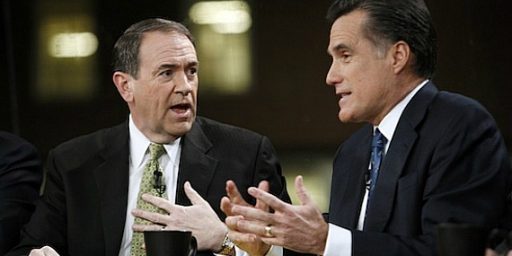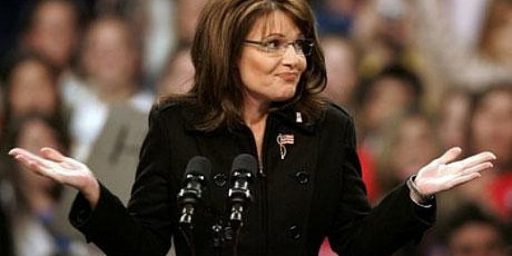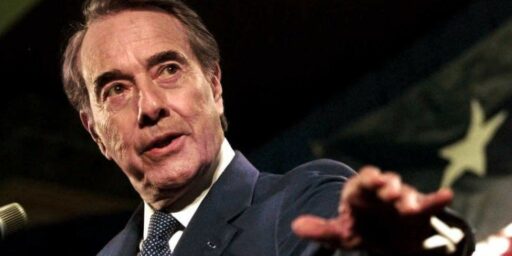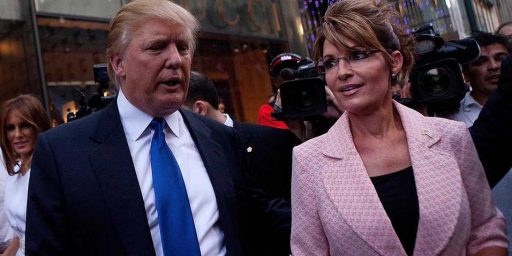Early Primary Polls: Better Than You Think?
Nate Silver argues today's polls "have a reasonable amount of predictive power in informing us as to the identity of the eventual nominee."
Nate Silver is doing a probably-three-part series titled A Brief History of Primary Polling. His thesis is that “national polls of primary voters — even this far out from the Iowa caucuses and New Hampshire primary — do have a reasonable amount of predictive power in informing us as to the identity of the eventual nominee.”
Part I, the only one yet posted, focuses on Republican primaries from 1976 onward, skipping those in which an incumbent president faced no serious opposition.
In early 1975, President Ford was polling at 38.3%, Ronald Reagan was polling at 19.7%. No other serious candidate got into the race. Ford narrowly won the nomination, then went on to lose narrowly to Jimmy Carter in the general.
In early 1979, Ronald Reagan led the possible contenders with 28.8%; Ford, who wound up not running, was at 17%; and everyone else was in single digits or less. Reagan won the nomination going away and became a two-term president. George H.W. Bush, who started at a mere 0.6% in the polls, though, was the second strongest candidate.
In 1987, Bush led the field at 35.9%, Bob Dole was at 20.7%, and everyone else was in the single digits. After a third place finish in Iowa, Bush cruised to the nomination and eventual election.
In 1991, incumbent Bush had a whopping 72.0% in the polls of likely primary voters, with Pat Buchanan at 15% and David Duke at 3.5%. Buchanan made some noise in New Hampshire but wasn’t a serious challenger.
In 1995, Bob Dole was the overwhelming frontrunner with 50.3%, Phil Gramm had 11.4%, and a passel of others were in the single digits. Dole ran away with it before getting clobbered by Clinton in the general.
In 1999, George W. Bush was at 46.1%, Elizabeth Dole at 18.2%, and everyone else in the single digits. Most everyone dropped out before the race even started, leaving John McCain, who started at 5.1%, as the only significant challenger. Bush of course won the nomination and two terms as president.
Finally, in 2007, Rudy Giuliani was the clear frontrunner with32.1%, McCain had 20.4%, Mitt Romney had 8.7%, and everyone else was in single digits. Giuliani of course imploded and McCain won fairly easily. Mike Huckabee, who technically finished second (by virtue of staying in the race long after it was over while Romney had long since dropped out) started with 1.7%.
The problem with this dataset is:
- It only has 7 cases, likely too few from which to draw meaningful conclusions.
- 2 of the 7 cases involve incumbent presidents; none has lost in modern times
- An additional case involves a sitting vice president; none who has run has been denied the nomination in modern times
In 2 of the 4 remaining cases, the eventual winner started with an overwhelming lead over the potential challengers–and in one of those the second place person in the poll never ran. That leaves one competitive case–the most recent–and the frontrunner was absolutely humiliated.
I’m not willing to draw a whole lot of deductive power from the foregoing, then, to the current polls. The gang at RealClearPolitics has averaged all of the national polls from February 12 through March 22:
So, we have four potential candidates in the double digits:
- Huckabee 19.9
- Romney 18.3
- Palin 13.1
- Gingrich 11.3
Of those, there’s a very strong chance that one or more will not run. Indeed, my sense right now is that neither Huckabee nor Palin will run. Of the candidates in the single digits, the only ones who are remotely plausible as 2012 nominees are Pawlenty and Daniels. The former is almost certainly running.
In the short history provided by Silver, no Republican who didn’t start in the top two won the nomination–and only one who wasn’t the frontrunner won the nomination. But, again, there’s a very strong chance that Huckabee will prefer the comfort and riches of his perch at Fox to a race for the nomination. And neither Palin nor Gingrich, at the end of the day, are plausible nominees. They simply have too much baggage.
So, my guess remains that either Romney–whose “turn” it is–or some governor not yet high on the radar screen will get the nomination.
via Taegan Goddard







In my opinion the eventual so-called republican nominee has not yet shown his or her face. At some point one of the few remaining adults in that party is going to have to say enough and get Jeb or another credible general election candidate to run. Of the four in double digits none can win the general. T-paw can’t win his home-state. And Daniels oversaw the Bush tax cuts that are primarily responsible for today’s debt, and predicted Iraq would cost 60 billion tops.
If no one else jumps in…the so-called republicans don’t stand a chance.
Better doesn’t mean good.